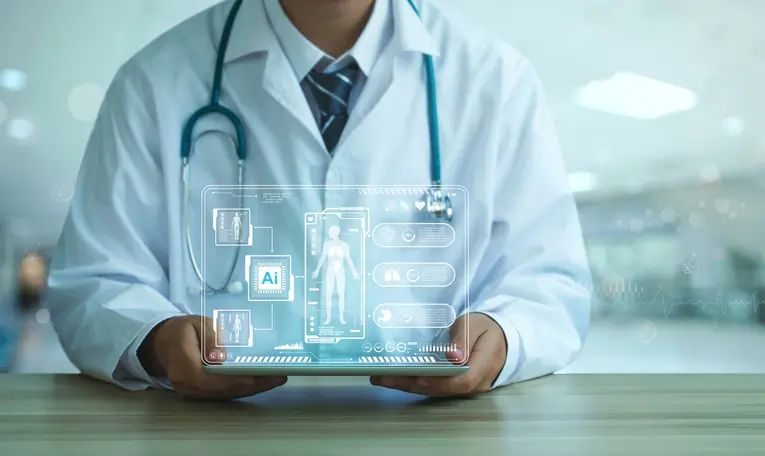
AI applications in enhancing healthcare diagnostics
In an era where technology and healthcare converge, Artificial Intelligence (AI) emerges as a beacon of hope, promising to redefine the paradigms of medical diagnostics. This intricate fusion of AI and healthcare not only paves the way for groundbreaking diagnostic procedures but also enhances the accuracy and efficiency of patient care. As we delve into the realm of AI applications in enhancing healthcare diagnostics, we uncover a future where AI’s potential to transform patient outcomes is boundless.
The dawn of ai in healthcare
The journey of AI in healthcare is a testament to human ingenuity and technological advancement. From its nascent stages to becoming a cornerstone of modern medical diagnostics, AI has traversed a path of innovation and discovery. This section will explore the evolution of AI in healthcare, highlighting key milestones and the transformative impact of AI technologies.
Revolutionizing patient diagnosis with ai
AI’s role in patient diagnosis represents a paradigm shift in healthcare. By harnessing the power of algorithms and machine learning, medical professionals can now predict, detect, and diagnose diseases with unprecedented precision. This segment will delve into the mechanisms through which AI enhances diagnostic processes, including image analysis, pattern recognition, and predictive analytics.
Ai-powered imaging: a new vision for diagnostics
The advent of AI-powered imaging has revolutionized medical imaging techniques. From radiology to pathology, AI algorithms interpret images with a level of detail and accuracy beyond human capability. This section will explore the advancements in AI-powered imaging, its applications, and the future prospects of imaging in diagnostics.
Predictive analytics: forecasting health outcomes with ai
AI’s predictive analytics capabilities offer a glimpse into the future of patient care, enabling healthcare providers to anticipate health outcomes and tailor treatments accordingly. This part of the article will examine how predictive models are being developed and deployed in healthcare settings, illustrating their impact on personalized medicine and preventive care.
Challenges and ethical considerations in ai-driven diagnostics
While AI in healthcare diagnostics promises numerous benefits, it also raises significant challenges and ethical considerations. Issues of data privacy, algorithmic bias, and the need for regulatory frameworks are paramount. This section will address these challenges, discussing the balance between innovation and ethical responsibility.
Case studies: ai transforming real-world healthcare
Real-world applications of AI in healthcare diagnostics are testament to its potential. This segment will present case studies highlighting successful implementations of AI technologies in diagnosing diseases, improving patient outcomes, and reducing healthcare costs.
The future of healthcare: ai-driven innovations on the horizon
As we look to the future, the possibilities of AI in healthcare diagnostics are limitless. This final section will explore emerging technologies and innovations, predicting how AI will continue to transform healthcare in the years to come.
Faqs
How does AI improve the accuracy of healthcare diagnostics?
AI enhances the accuracy of healthcare diagnostics through several key mechanisms. Firstly, AI algorithms can analyze vast amounts of medical data—such as images, patient records, and genetic information—much faster and more accurately than human professionals. This capability is particularly beneficial in identifying patterns or anomalies that might be subtle or complex for human eyes, such as early-stage tumors in imaging scans or predicting disease onset from genetic markers.
Secondly, AI improves diagnostic accuracy by learning from data. Machine learning models, a subset of AI, improve over time as they are exposed to more data, leading to refined and more accurate diagnostic predictions. This continuous learning process ensures that AI systems can adapt to new information, making them invaluable in rapidly evolving fields like oncology or infectious diseases.
Lastly, AI can integrate diverse data sources, providing a holistic view of patient health. By analyzing data from electronic health records (EHRs), lab results, genetic testing, and wearable devices, AI can offer comprehensive insights, leading to more accurate and personalized diagnostics.
What are the main applications of AI in medical imaging?
AI has several transformative applications in medical imaging, including:
Automated Image Analysis: AI algorithms can automatically detect abnormalities in images such as X-rays, MRIs, and CT scans with high precision. This is particularly useful in radiology, where AI can help identify conditions like fractures, tumors, or signs of chronic diseases at an early stage.
Enhanced Image Quality: AI can improve the quality of medical images by reducing noise and enhancing important features, making it easier for radiologists to interpret them.
Predictive Analysis: Beyond diagnosing existing conditions, AI in medical imaging can predict the likelihood of future diseases, aiding in preventive medicine. For instance, AI can analyze retinal images to predict cardiovascular risks.
Workflow Optimization: AI helps streamline the diagnostic workflow by prioritizing urgent cases, thus ensuring that patients requiring immediate attention are diagnosed faster.
What challenges do healthcare providers face in implementing AI technologies?
Implementing AI in healthcare diagnostics comes with its set of challenges, including:
Data Privacy and Security: Ensuring the confidentiality and integrity of patient data is a significant concern, especially given the sensitive nature of health information.
Integration with Existing Systems: Integrating AI technologies with existing healthcare IT systems can be complex and resource-intensive.
Algorithmic Bias: AI models may inherit biases present in their training data, potentially leading to disparities in healthcare outcomes among different patient groups.
Regulatory and Ethical Issues: Navigating the regulatory landscape and addressing ethical considerations, such as informed consent and decision-making autonomy, are critical for successful implementation.
How can AI contribute to personalized medicine and preventive care?
AI contributes to personalized medicine and preventive care by enabling the analysis of genetic, environmental, and lifestyle factors to tailor treatments to individual patients. By leveraging data from various sources, AI can identify risk factors and predict disease progression, allowing for early intervention and customized treatment plans. This approach not only improves patient outcomes but also optimizes resource allocation in healthcare systems.
What ethical considerations must be taken into account with AI-driven diagnostics?
Ethical considerations in AI-driven diagnostics include:
Transparency: Patients and practitioners should understand how AI tools make diagnostic decisions.
Accountability: It must be clear who is responsible for the outcomes of AI-driven diagnostics—the developers, the users, or both.
Fairness: AI systems should be free of biases that could lead to unequal treatment of different patient groups.
Privacy: Protecting patient data used in AI systems is paramount to maintaining trust and confidentiality.
AI applications in healthcare diagnostics mark the beginning of a new era in medicine. By enhancing diagnostic accuracy, improving patient outcomes, and streamlining healthcare processes, AI stands at the forefront of medical innovation. As we embrace this technological revolution, the future of healthcare looks brighter than ever.

